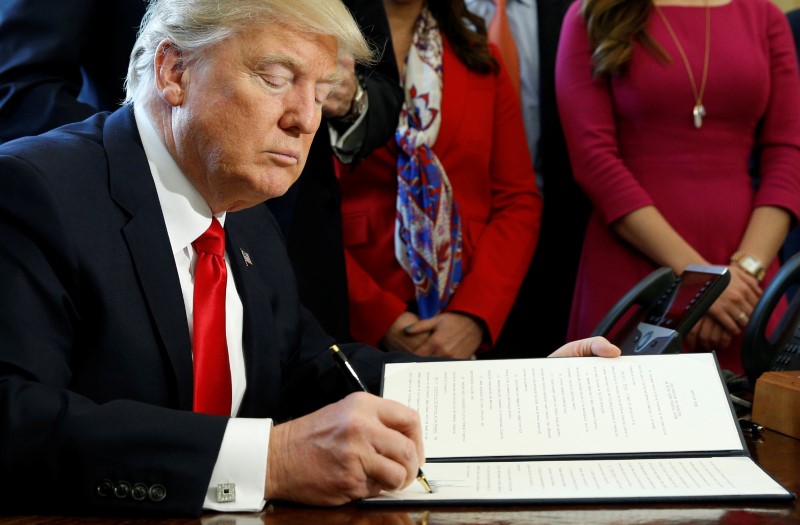By Pete Schroeder
(Reuters) - Bank lobbyists who opened the Trump era with great expectations for sweeping regulatory reform are privately striking an increasingly dismal tone as hopes for a quick and thorough rewrite of Dodd-Frank legislation dim.
Lobbyists say they are facing the reality that bank deregulation legislation will have to wait in line behind other bigger priorities such as healthcare reform and taxes.
"It's so disheartening," said one financial industry representative. “I was excited for this year, and I’m not anymore.”
Even if Congress does look to rewrite the 2010 Dodd-Frank law, it is unlikely to muster enough votes in the Senate for the strong across-the-board overhaul industry leaders had hoped for, roughly a half dozen lobbyists told Reuters in recent interviews.
Banks say that Dodd-Frank, which was conceived in response to the financial crisis, hobbles their growth.
Among Dodd-Frank measures that banks want to see changed are the law's ban on proprietary trading, heightened oversight for some of the nation's largest institutions, and stricter capital requirements.
But they see short-term hopes for less stringent oversight by agencies like the Federal Reserve or the Securities and Exchange Commission stymied by the slow pace of Trump appointments for those agencies.
The private dejection is in contrast to the upbeat message being delivered to some 1,500 bankers gathered in Washington this week for visits to Congress and speeches from policymakers at an American Bankers Association (ABA) conference.“This year poses the biggest opportunity that we have seen in a long time to see some action on much-needed regulatory relief," Rob Nichols, the ABA's president and chief executive officer, said at the conference.
Senate Banking Committee Chairman Mike Crapo, the Idaho Republican who will play a key role in any regulatory rewrite, has downplayed immediate expectations. He has emphasized that work in the Senate is slow going.
Crapo announced Monday he wanted public input on proposals, underlining the deliberate pace of the panel's work.
And the Republican chairman of the House of Representative Financial Services Committee, Jeb Hensarling, has yet to move on his prepared Dodd-Frank overhaul.
Industry advocates say they have hoped sympathetic regulators could take major steps absent Congressional action. But the Trump administration has lagged in naming people for key roles, such as Federal Reserve's vice chair for supervision.
For instance, a sympathetic Federal Reserve could relax the "living wills" process applied to large banks to determine how they could be dissolved if necessary. And a friendlier SEC could act to roll back rules on industry-opposed measures like requiring companies to disclose the pay ratio between their CEO and the average employee.
To be sure, there likely will be some action this year to help banks, though it is likely to be much more limited than the Trump transition team led bankers to expect when it said one day after the November election that it would "dismantle" Dodd-Frank.
There appears to be bipartisan appetite for easing capital formation rules or reducing the regulations that smaller banks and credit unions must comply with.
Republicans in Congress could attack specific parts of Dodd-Frank, such as gaining control over funding of the Consumer Financial Protection Bureau - which was created to help guard individuals from fraud in mortgages, student loans and other financial products - through a budget process that would eliminate the need for Democratic support.
Bankers preparing on Tuesday to head to Capitol Hill to make their case heard James Ballentine, a lobbyist for the ABA, emphasize the need to stay on message with stories about the impact of regulation on their banks. He noted they would be competing with wiretapping allegations, Federal Bureau of Investigation probes, Supreme Court confirmation hearings, and a massive healthcare push all at once.

"None of those things should be topics of your conversation when you go to meet with your members of Congress," he cautioned the conference crowd.